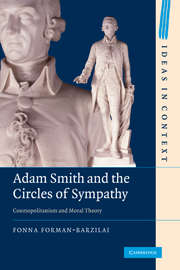Book contents
1 - Conflicted self
Published online by Cambridge University Press: 03 May 2010
Summary
We must soften into a credulity below the milkiness of infancy to think all men virtuous. We must be tainted with a malignity truly diabolical, to believe all the world to be equally wicked and corrupt.
Edmund Burke, Thoughts on the Cause of the Present DiscontentsAnd what a malignant philosophy must it be that will not allow to humanity and friendship the same privileges which are undisputedly granted to the darker passions of enmity and resentment. Such a philosophy is more like a satyr than a true delineation or description of human nature, and may be a good foundation for paradoxical wit and raillery, but is a very bad one for any serious argument.
David Hume, An Enquiry Concerning the Principles of MoralsUntil very recently, philosophers tended to ignore Adam Smith. They acknowledged his idea of sympathy in the Theory of Moral Sentiments, but generally regarded it as superficial and unsophisticated, and tended to dismiss Smith as a minor figure in the shadow of David Hume. Moreover, he was regularly cast aside as a crass materialist who reduced human motivation to selfishness and corrupted the world with a moral justification for capitalism. In this environment, Smith scholarship was left to the mercy of economists and historians of economics who because of their training and pressing worldly concerns tended to subordinate or ignore Smith's moral philosophy.
- Type
- Chapter
- Information
- Adam Smith and the Circles of SympathyCosmopolitanism and Moral Theory, pp. 29 - 55Publisher: Cambridge University PressPrint publication year: 2010



